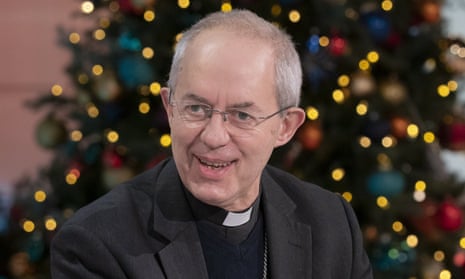The archbishop of Canterbury has called for a new “covenant” on social care between the state and the people, similar to the provision of the NHS and education, which makes “absolute value and dignity” the top priority.
Justin Welby, the leader of the Church of England, said that focusing on managing the cost of social care, a priority in the latest government reforms, is “the wrong way round” because it fails to consider what people who need care want.
“You start with the value of the human being,” Welby said. “Then you say, ‘what is the consequence of that? [in terms of the care system]’. We did that for the health service. We haven’t done that for social care.”
He called for a deal that would make the best possible care for all “a national obligation”.
Welby was speaking out before a parliamentary battle over the funding of social care. A new tax and a cap on care costs to prevent most people from having to sell their homes are at the heart of the government’s proposed reforms of the sector, which affect 11 million people in the UK as carers or care recipients.
Ministers have resisted calls from MPs, care experts and the former health secretary Jeremy Hunt to inject at least £7bn a year in new money to stabilise social care after nearly two years of crisis, with the pandemic leaving parts of the system in collapse. Scotland is pursuing a different approach and is consulting on setting up a new National Care Service.
The archbishop said: “There isn’t a clear vision for care. We know the vision for the NHS: ‘free care at the point of use’. You can sum it up in a sentence … We keep putting the cart before the horse. We keep talking about how we are going to pay for it when we don’t really know what we want to pay for.”
The House of Lords, in which Welby sits, will soon consider plans for financing the cap on social care. Under the government plans poorer people will lose a larger proportion of their wealth than richer people and their homes may still be sold to finance their care. The upper chamber is expected to demand changes to the proposal that has been labelled unfair.
Welby is pressing for a more profound reform. “You have to have a covenantal approach which says regardless of who you are, of your economic value, of your utility, society covenants to give you the best possible care it can as you approach the end of your life,” he said.
That means making social care “a community obligation, not just a family obligation”.
Welby’s father-in-law lived with him and his wife for the last year of his life, with his wife, who trained as a teacher, spending many years caring for him. Their daughter receives care funded by a carer’s allowance, and lives with them.
“If it is just a family obligation it is totally unjust because poorer families, families struggling to make ends meet, families with significant debt simply will feel guilty,” Welby said.
“We have got to get rid of the guilt. It is a community obligation. We have done that in health and education, we need to do that with social care. It is a national obligation, expressed by the state. The state at the very least has to underwrite that covenant, as it does with health.”
Welby and the archbishop of York have commissioned a review of social care to examine the wishes and needs of people who use it, which will report back in the spring.
The Archbishops’ Commission on Reimagining Care is chaired by Dr Anna Dixon. She said: “The care system is not enabling people to live a full life. People are not being supported to live the lives that they want or any of us would choose for ourselves.”
The commission has produced a list of values to underpin a future vision of care. They “include concepts that are not usually heard in policy discussions about care, such as flourishing, loving kindness, empathy, trust and justice”.
“This affects all of us,” Dixon said. “At one time or another we are needing care or providing care. We have got to get away from seeing this [as a] thing that happens to someone else.”
Welby said that often when discussions about someone’s end of life care focus on cost “my colleagues who work with me here [at Lambeth Palace] from Africa and the global south just find that incomprehensible. They start with saying they are very special.”
He added that in the UK people don’t like to talk about the final stages of ageing. “We jump from being a respected elder, who is independent and able, and we close our eyes to the next stage, Shakespeare’s sixth and seventh age of man … the next thing you have is the obituary,” he said. “We leave out the bit between being competent and the obituary.”
“There is a point at which our individual autonomy is lost but we are still alive,” he said. “At that point in a really healthy society, the community says because we love you and value you as an individual we will ensure the maximum possible dignity and care in this period, whether it be long or short.”
